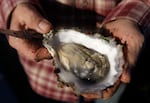
FILE-Oysters harvested from Puget Sound in December are being recalled by the U.S. Food and Drug Administration due to a possible norovirus contamination.
Eric Risberg / AP
The U.S. Food and Drug Administration is recalling oysters harvested from Puget Sound in December, citing possible norovirus contamination. It’s one of several recalls to impact the Pacific Northwest’s shellfish supply in the past month.
The latest oysters of concern were harvested from Hammersley Inlet between Dec. 2 and Dec. 17 and distributed across Washington and Oregon by Shelton-based company Ruco’s Shellfish. Other states could be impacted too, according to the FDA.
Previously, the agency recalled oysters harvested from British Columbia between Nov. 27 and Dec. 5., and from Pickering Passage between Nov. 15 and Dec. 11, respectively. Those oysters were also linked to a norovirus outbreak.
The FDA warns that contaminated oysters could still appear, taste, and smell normal, and is advising businesses and individuals to dispose of them immediately.
Common symptoms of norovirus include diarrhea, nausea, vomiting, and stomach pain, which typically develop within 12 to 48 hours of exposure. While anyone can become sick from the virus, people with compromised immune systems are at greater risk of severe illness. Norovirus symptoms can also lead to dehydration, the FDA warns, especially among young children and older adults.
The agency recommends that people experiencing symptoms after consuming oysters contact their health care provider and local health department.
This story comes to you from the Northwest News Network, a collaboration between public media organizations in Oregon and Washington.
This republished story is part of OPB’s broader effort to ensure that everyone in our region has access to quality journalism that informs, entertains and enriches their lives. To learn more, visit our journalism partnerships page.